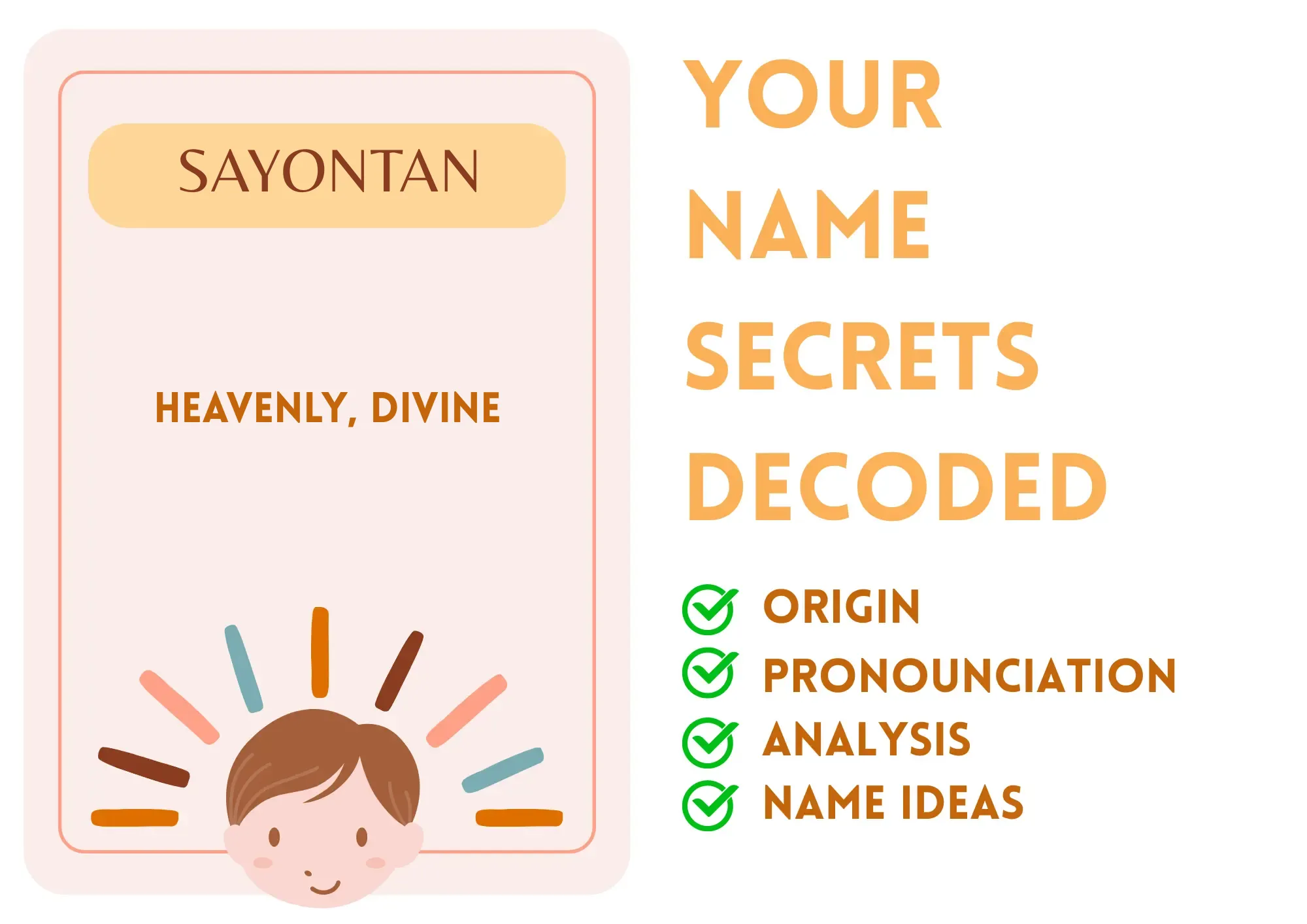
Sayontan
Sayontan is a name rich in cultural heritage and significance, primarily found in Indian culture. The name is derived from Sanskrit, where it translates to 'one who is heavenly' or 'divine'. It is predominantly a masculine name and is commonly given to boys with the hope that they will embody divine qualities and virtues.
Sayontan holds spiritual significance in Hinduism, often connected to ideals of purity and kindness. It is a name that parents often choose for the positive traits they wish to associate with their child, making it a beloved option in Indian families.
This name is well-regarded in its cultural context and evokes feelings of serenity, virtue, and a connection to the divine. Its unique sound and depth of meaning make it appealing, although it may not be immediately familiar to non-Indian speakers.
Basic Information
Gender: Boy
Sounds Like: sah-yohn-tahn
Pronunciation Explanation: The name is pronounced with emphasis on the second syllable, 'yohn', followed by a soft 'tahn'.
Summary and Meaning
Meaning: heavenly, divine
Origin: The name Sayontan has Indian roots, specifically in the Sanskrit language, which is a significant backdrop for many Hindu names.
Usage: Sayontan is traditionally a masculine name and is typically assigned to boys.
Name Number (Chaldean)
Name Number (Pythagorean)
Name Constellation (Nakshatra)
Name Zodiac Sign (Rashi)
Popularity (Global Rank)
Overall: 483000
Boys: 72681
Most Popular in
Religious and Cultural Significance
Religion: Hindu
Background: In Hinduism, Sayontan is significant as it relates to divinity and heavenly qualities, linking the bearer to spiritual virtues.
Cultural Significance: In Indian culture, names with spiritual meanings are highly valued. Sayontan is often given to boys with hopes of instilling characteristics associated with divinity and righteousness.
Historical Significance: The name Sayontan, with its origins in Sanskrit, represents divine ideas that have been celebrated in historical texts and cultural narratives of India.
Popular Culture
Literature and Mythology: Sayontan is less commonly featured in mainstream literature but embodies themes of divinity and virtue in various folk tales.
Movies and Television: There's limited representation of the name in popular Indian cinema, but it may symbolize characters with a strong moral compass or heavenly attributes.
Feelings and Perceptions
Perception: Sayontan is perceived positively, associated with virtue, grace, and an ethereal presence. Its uniqueness is admired, even if it sometimes presents a challenge in pronunciation to those unfamiliar with it.
Positive Feelings: Unique, divine, serene, virtuous, noble, spiritually strong.
Negative Feelings: Might be challenging for non-native speakers to pronounce; it may feel overly formal or uncommon in some cultures.
Practical Considerations
Ease of Writing and Calling: Sayontan is moderately straightforward to write; however, it has three syllables which could make it somewhat lengthy to say quickly. It's less common than simpler names, which may require some explanation to others.
Common Typos and Misspellings: Sayonatan,Sayantan,Sayanthan,Saiyontan
Common Nicknames: Sayo,Tan,Sayan
Sayontan Popularity
Sayontan Usage and Popularity By Country
| Country | Rank (Overall) |
|---|---|
| Bangladesh | 35293 |
| Malaysia | 93908 |
| India | 156465 |
| United States | 262335 |
Sayontan Usage and Popularity By City
| City | Rank (Overall) |
|---|---|
| Calcutta | 15278 |
Compatibility Analysis
Famous Persons Named Sayontan
No results found for Sayontan.
Related Names
Similar Sounding Names:
Sajan,Savant,Samantan,Shayantan